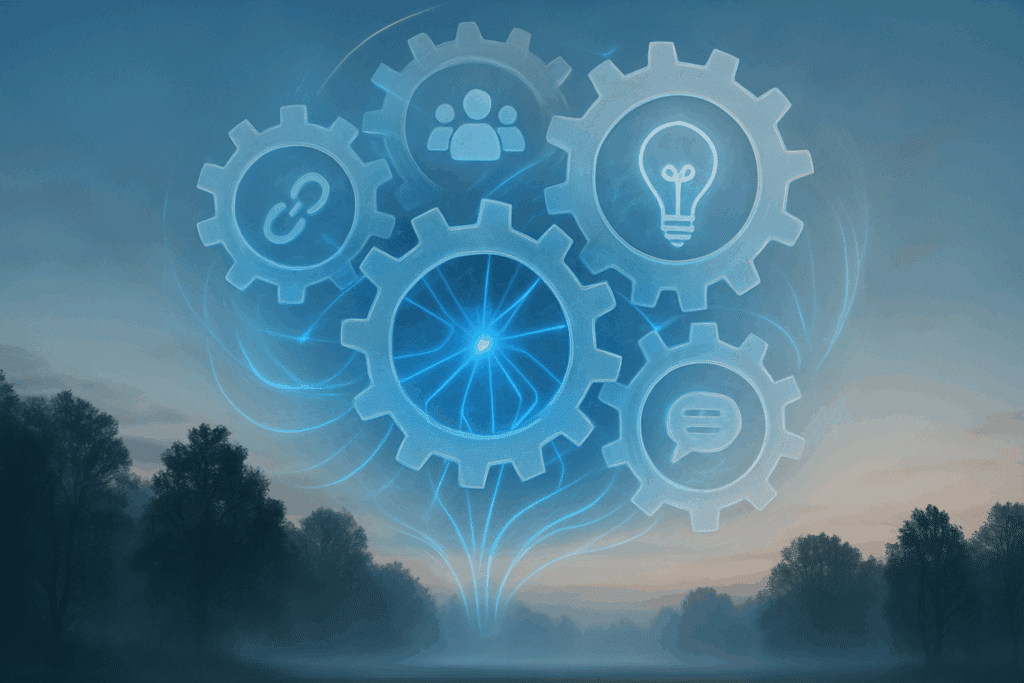Integrating AI into digital marketing
The integration of artificial intelligence (AI) into digital marketing has become a key element in optimizing campaign performance and personalizing the customer experience. Used wisely, this technology can analyze complex data, automate tasks and improve the ROI of marketing strategies.
- The understanding of consumer behavior is refined thanks to machine learning and natural language processing.
- Marketing automation facilitates campaign management by delegating repetitive tasks to intelligent tools.
- Content personalization is based on precise analysis of users’ centers of interest.
- Real-life examples such as Netflix and Amazon demonstrate the increased effectiveness of campaigns thanks to AI.
- Data quality and team training play a key role in the success of AI integration.
Why integrating AI into digital marketing is crucial
AI integration in digital marketing meets growing needs for efficiency and personalization in a highly competitive digital environment. At a time when customer data is multiplying, companies are looking to exploit this information to better target their campaigns. Artificial intelligence offers advanced processing and analysis capabilities, enabling raw data to be transformed into strategic levers. This topic concerns digital marketing players, campaign managers and companies wishing to optimize their performance while automating certain key activities.
Definition and principles of AI in digital marketing
Artificial intelligence applied to digital marketing encompasses technologies such as machine learning and natural language processing (NLP). These technologies improve the ability of systems to understand and predict consumer behavior. Unlike traditional methods, AI offers in-depth and instantaneous data analysis, facilitating real-time personalization of content and marketed offers. By automating certain functions, it also optimizes the resources available to marketing teams.
Artificial intelligence applications in digital marketing
AI has several applications in digital marketing, helping to improve campaign performance while automating complex processes:
- Data analysis and trend detection: AI analyzes large volumes of data to identify customer behavior and anticipate market trends. This helps adjust marketing strategies in real time to stay competitive[3][7].
- Task automation: Marketing automation relies on AI to manage repetitive tasks such as customer segmentation, data analysis and social network management. This automation increases productivity and reduces margins of error[3][7].
- Content personalization: By analyzing user behavior, AI enables us to precisely target centers of interest and offer personalized recommendations, as Netflix and Amazon do, thus improving customer engagement[3][7].
- Content generation: Artificial intelligence can automatically create diversified content – text, video, images – accelerating the production and effectiveness of marketing campaigns[5].
- Optimizing advertising campaigns: AI identifies the best-performing channels and adjusts budgets in real time, helping to maximize campaign ROI[9].
Practical examples of AI integration in digital marketing
Several companies have successfully deployed artificial intelligence solutions to strengthen their marketing strategies:
- Amazon Personalize: This technology is used by groups such as Warner Bros. Discovery to offer personalized content, significantly increasing user engagement[3].
- Netflix: The platform leverages AI to suggest content tailored to each user’s preferences, optimizing customer experience and loyalty[7].
AI integration challenges and risks
Despite the many benefits, integrating AI into digital marketing also brings significant challenges:
- Dependence on quality data is crucial. Without accurate, reliable data, the results of AI systems can be erroneous or misleading[2][13].
- Managing AI technologies requires specific skills and technical expertise, which necessitates investment in training and recruitment[12].
- Confidentiality and data protection issues must be rigorously addressed to comply with regulations and maintain consumer confidence[2][13].
Strategies for effective AI integration in digital marketing
To take full advantage of artificial intelligence in digital marketing, several best practices are recommended:
- Identify strategic objectives: Clearly define how AI is to contribute to marketing objectives and improve campaign performance[12].
- Develop specific skills: train marketing teams in AI technologies to ensure optimal use of tools and methods[12].
- Invest in data quality: Implement rigorous processes to ensure the accuracy, relevance and security of the data used by AI systems[13].
Summary and recommended actions
The integration of artificial intelligence into digital marketing is profoundly transforming traditional methods, bringing finer analysis, greater automation and enhanced campaign personalization. The examples of Amazon and Netflix perfectly illustrate the performance gains achieved. However, this integration requires a considered strategy, rigorous data management and investment in training to guarantee optimal results. Implementing AI represents an essential strategic lever for improving the performance of marketing campaigns, while controlling the risks associated with data confidentiality and quality.
To delve deeper into this topic and benefit from the latest innovations in marketing automation and AI integration, it’s essential to regularly follow the news and solutions offered by experts in the field.
















